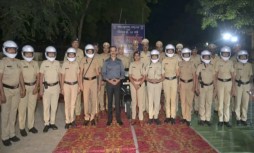The Agarwals of Haldiram Bhujia: A family’s journey through legacy, property dispute, net worth, and more
February 06,2024
In the expansive and competitive domain of the Indian food industry, Haldiram has emerged as a name synonymous with success. Originating as a modest sweet shop in Bikaner, Rajasthan, it has evolved into a multi-crore enterprise, reshaping perceptions of traditional Indian snacks and sweets.
Driven by a vision to provide high-quality traditional Indian snacks and sweets, Haldiram embarked on a transformative journey, earning recognition as one of India’s most distinguished food brands. Renowned for its delicious namkeens, including bhujia, sev, and an array of traditional sweets, Haldiram’s products’ consistent quality, and flavors have fostered trust and loyalty among customers nationwide.
The Agarwal family, deeply rooted in the food industry, especially snacks and sweets, boasts a fascinating and extensive history. Over six generations, they have built a substantial fortune, showcasing a keen understanding of spices and a remarkable ability to navigate legal battles while outperforming multinational corporations. Their business, with Haldiram’s alone valued at an impressive Rs 7,000 crore, has become a household name in India, with products sold under various brand names such as Haldiram’s, Haldiram’s Prabhuji, Bikanervala, Bhikharam Chandamal, Bikaji, and Bikano.
Beneath their remarkable success, however, lies a narrative of intra-family conflicts and acrimonious legal disputes, with the most prominent revolving around the coveted brand name Haldiram’s. Various Agarwal family members are entangled in legal conflicts, each striving to assert rights over the brand’s name and its associated legacy. These intense legal battles underscore the complexity and competitiveness within the family, where control over the Haldiram’s brand signifies not only financial value but also pride and recognition.
This is the saga of how the Agrawals forged an empire, creating one of India’s premier snacks, sweets, and restaurant chain brands. This is the story of Haldiram’s…
The Haldiram’s Narrative
In the picturesque city of Bikaner, Rajasthan, a young boy named Ganga Bishan Agarwal, affectionately known as Haldiram, found himself immersed in his father’s Bhujia business. Bikaner, familiar with Bhujia—a savory snack crafted from chickpea flour or besan—witnessed Haldiram’s early creative spark. Even at a tender age, he envisioned a unique twist to the traditional Bhujia—a thinner version made from moth flour instead of besan.
In 1919, Haldiram’s experiment within his father’s humble shop proved an instant hit. The distinctive flavor and texture of his moth flour Bhujia resonated with the people of Bikaner, laying the foundation for two entities that would one day amass a combined revenue of around Rs 9,000 crore.
As Haldiram matured, he had three sons—Moolchand, Satyanarayan, and Rameshwarlal. The four sons of Moolchand, along with their sister Saraswati Devi, became torchbearers of the family legacy, elevating various snack companies to unprecedented heights.
Kolkata: 1950s
In the 1950s, Haldiram, with sons Satyanarayan and Rameshwarlal, ventured to the bustling city of Kolkata. There, they established the iconic brand “Haldiram Bhujiawala.” Accompanying them on this venture was Haldiram’s eldest grandson, Shiv Kishan. While the younger sons managed the original Bikaner shop, the Kolkata business experienced exponential growth, expanding beyond traditional Bhujia.
Rapid Growth
From the 1960s to the 1990s, Haldiram’s empire witnessed swift growth and transformation. Ganga Bishan returned to Bikaner, passing on the reins to sons Rameshwarlal and Satyanarayan. However, Satyanarayan, opting for his entrepreneurial journey, founded “Haldiram & Sons.” Unfortunately, he couldn’t replicate his father’s triumphs. Simultaneously, Rameshwarlal severed ties with his brother Moolchand, leading to the separation of the Kolkata and Bikaner businesses.
In the 1980s, Shiv Kishan Agarwal, along with his sister Saraswati, ventured to Maharashtra, particularly Nagpur, achieving remarkable success. Simultaneously, Moolchand’s youngest sons, Manoharlal and Madhusudan, entered New Delhi in 1984, propelling the brand to national and international recognition. In Bikaner, Shiv Ratan, Moolchand’s son, took charge, shaping it into Bikaji, which recently went public.
Prabhu and his brother, managing the Kolkata entity, were prohibited from using the names “Haldiram’s” or “Haldiram” in Delhi. The Haldiram businesses now operate as independent entities, each with its unique identity. The Delhi unit, led by Manoharlal and Madhusudan Agarwal, emerged as the revenue leader, generating close to Rs 5,000 crore. Nagpur, guided by Shiv Kishan Agarwal, followed closely with Rs 4,000 crore, while Bikaner, helmed by Shiv Ratan Agarwal, amassed around Rs 1,600 crore.
With Bikaji’s recent IPO, the three brothers are gearing up to merge their businesses and initiate their IPO within the next year and a half. However, Pankaj Agarwal, Manoharlal’s son and an integral part of the Delhi business, expressed concerns about the complexities arising from brand division and internal structure.
On June 5, 2005, Prabhu was detained on suspicion of attempting to harm the proprietor of a tea business, aiming to gain access to the land in front of the food mart he was constructing. Today, the Agarwal family’s legacy stands tall, leaving an indelible mark on the Indian food industry. Their brand names have become household favorites, and their products continue to delight millions across the country. As they navigate legal battles and strive for business excellence, the Agarwals remain an emblem of the tenacity and ingenuity often associated with successful business families in India.










